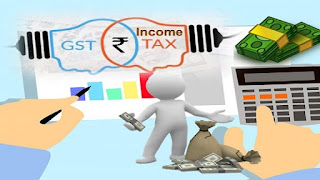LETS KNOW ABOUT THE DISTINCTION BETWEEN GST AND INCOME TAX.
First let us get clear about the definitions of GST and income tax.
The Goods and Services Tax (GST) is an indirect tax (or consumption tax) levied on the supply of goods and services in India. It is a comprehensive, multistage, destination-based tax: comprehensive because it has absorbed nearly all indirect taxes, with the exception of a few state levies. Because the production process is multi-staged, the GST is levied at each stage.However, it is intended to be returned to all parties involved in the different phases of production other than the final consumer, and as a destination-based tax, it is collected at the point of consumption rather than the place of origin as previous taxes were. Below are the types of GSTs in our country.
The Central Goods and Services Tax (CGST)
The State Goods and Services Tax (SGST)
The Union Territory Goods and Services Tax (UTGST)
The Integrated Goods and Services Tax (IGST)
Whereas an income tax is a tax levied on persons or businesses (taxpayers) based on their earnings or profits (commonly called taxable income). In most cases, income tax is calculated as the result of a tax rate multiplied by the taxable income. Taxation rates may differ depending on the taxpayer's attributes and the source of income.
Each year and, the government collects an involuntary sum from people or corporations in the form of a tax. Every government enforces tax collection and payment laws.Consequently, taxes come in a variety of forms. In the present era, the most visible taxes[1] are the Goods and Services Tax (GST) and the Income Tax. Both of these taxes help the government, although the taxing policies differ significantly.
The key contrast between GST and Income Tax is that GST is imposed on the consumption of goods and services, whereas income tax is levied on a person's income. In certain aspects, GST is an indirect tax, whereas income tax is a direct tax.
It is imposed on the purchase of goods and services. It is levied on a person's income earned in a given year.
Type of Tax It is an indirect tax paid to the government. It is a tax paid back to the state.Tax filing requirements GST If the annual turnover exceeds 40 lakh rupees, registration is necessary.It has a broad scope since all members of society are taxed. It is limited to a single corporation or individual taxpayer. It is transferable from one individual to another.
On the other side income tax is imposed on a person's income earned in a given year.This is a tax paid directly to the government.If a person's annual income exceeds 2.5 lakh rupees, he or she must pay income tax.The individual cannot divert the cost to anybody else since everyone earning more than 2.5 lakh rupees must pay the tax on his or her own.Salary, housing property, capital gain, and other types of income are subject to income tax.It is limited to a company or an individual taxpayer.It cannot be transmitted on to some other person.
Diving onto some more key differences between the two -
GST is a multi-stage, destination-based tax. It is named comprehensive because it has consolidated different indirect taxes into a single form. It has mostly replaced indirect taxes such as central excise duty, services tax, extra customs duty, and some value-added taxes.GST was implemented as a single indirect tax for the entire country, and this taxing approach prevents the cascading of multiple levies. GST returns can be submitted electronically.
On the flip side ,Income tax is a tax levied by the government on earnings. It is an important source of revenue for the government. The revenue generated by the tax is utilised to fund the country's growth. The tax percent is directly related to an individual's income, which implies that the larger the income, the more the tax must be paid.
It is a statutory necessity for every person of the country to pay taxes on time. Indirect and direct taxes are GST and income tax, respectively. They provide a significant contribution to the government's revenue. Income tax is due in one’s role as a person, whereas GST is due position as a consumer.



Comments
Post a Comment